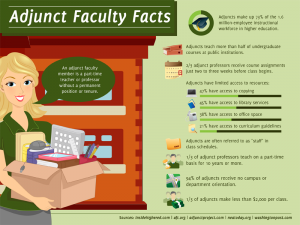Adjunct: “a thing added to something else as a supplementary rather than an essential part”.
I’ve been teaching Sociology as an “adjunct” for nearly 20 years. I
never liked this descriptor, but I learned early on that most students
don’t know or seem to care about my title or my status, and for me,
that’s the bottom line. I have found that students are oblivious to
stratification within academia – the cascade of titles and honors that
starts with part-timers at the bottom, and then officially begins with
Assistant Professor, the tenuous first step which initiates the gradual
and arduous climb up and up, until – if lucky – one reaches Associate,
Full and eventually, at the far end of the career spectrum, Emeritus,
the end of the line, after decades of classes taught, research
conducted, peer-reviewed articles and books published, talks given and
dissertations advised.
That said, most students just assume that their teacher is the professor, unless that teacher is still a graduate student. In fact, in every undergraduate class I have taught, students insist on calling me “Professor”, even when I tell them to call me by my first name. I generally stop short of telling them about my status in the academic chain; I also don’t tell them that they may never see me again because I’m not sure if I’ll be re-hired. I have had some teaching jobs where students are shocked when, at the end of the semester, they hear I might not be back the following year. Sometimes, that opens up the conversation about stratification within the academic labor market. After all, this is Sociology, where issues of class, gender and race are paramount. Why not insert one’s own “social location” into the mix?
The increase in employment of part-time, adjunct faculty in academia has become an “issue” for some university systems, especially when union contracts or state laws limit the number of part-time faculty. Despite bloated administrative budgets and the building of new athletic centers and sports arenas designed (in some places) to make an institution more “competitive”, the teaching staff is where pennies are pinched.
Adjunct teaching an add-on rather than central
Teaching as an adjunct is not my “full-time work”; it truly is an adjunct to my career, in which I co-run a small social science consulting group called Arbor Consulting Partners (www.arborcp.com). In other words, thankfully, I don’t depend on this income as my “bread and butter”. Teaching is my passion but it’s really hard to make a living teaching as an adjunct.
I have been lucky to not be at the bottom end of the adjunct pay scale – which can be as low as $2,000 per course, but the wages generally hover around $5,000-6,000 at many research universities, unless you’re teaching at one of the “prestige” institutions. Many adjuncts piece together a string of teaching gigs, sometimes as many as 6 classes per semester and sometimes in different institutions, just to pay the bills. They/we receive no benefits, and while they are teaching a full load, they often don’t have an office – or if they do, they share it with all the other part-timers, so it’s hard to use for meetings with students or to get any work done. Adjuncts can work their butts off and still be poor and disenfranchised.

Generally, an adjunct functions outside of the system. We’re not paid to go to meetings or advise students. This is fair, given that we’re only paid to teach. But for those who would like to be more involved – and even be considered for a tenure track position – this status can be a liability. New hires in academia are judged for their ability to teach and advise students, and in research universities, they are judged by their academic scholarship. Adjuncts rarely have time to pursue their own research, and if they do, it’s on their own dime, unless they have sought and received a grant, which is harder to do without an institutional base. Some universities even disallow part-timers from receiving university grants.
Having the capacity to teach many different courses is central to any adjunct’s survival. I have taught a variety of Sociology courses in a range of academic institutions, including courses on aging, sex and gender, feminist theory, work and family policy, gender and leadership, and most recently, a course on Evaluation Research, which is the work I do as a consultant. For some of those jobs, I had a one-year contract, but mostly, I have been teaching by the course and by the semester, with the possibilities of returning, which I have now happily done in three of the institutions where I have taught. Generally, I have either replaced a professor who is on-leave, taught a course that full-time faculty didn’t have time to teach, or more recently, I have taught courses that no one else has the expertise to teach.
One thing that I love about teaching at the university level is the freedom to design a syllabus, regardless of whether a course has been taught by another professor. Not all adjuncts get to do this. Over the years, I have experimented with incorporating the arts into my teaching, and invariably, other professors (those on the ladder) tell me they think it’s really cool. I have been lucky that, for me, teaching as an adjunct is a choice. I have also had some incredible colleagues, supportive and inclusive. But many adjuncts do not feel they are treated as equals relative to full-time faculty.
Unionizing the adjunct labor force

So where do I stand? I strongly believe that it is in the interests of all parties within academia for Part-time Faculty to be paid well and have good working conditions, including consistency in the courses they teach and multi-year contracts, as this contributes to the overall quality of education at the institution. At the same time, Universities should not rely so heavily on part-time labor. The slow creep of an unstable labor force comprised of part-time contracted workers is a disservice to students, their parents and the institution overall.

Historically, it has always been challenging to organize “professional” workers, given the notion that labor unions are associated with blue-collar workers, not teachers or nurses or social workers, who are falsely considered “above that”. But frankly, this notion is just a way to hold back the collective strength of workers from having more power. The move to organize adjunct labor – just like the move to organize all workers who are underpaid and undervalued – is critical not just to the individuals who directly gain from union representation; it is also critical for the broader society and economy.


David Kociemba, President of the American Association of University Professors (AAUP) at Emerson College, where he teaches in the Department of Visual and Media Arts, is quoted as saying the adjunct movement is “four decades in the making”, but he was able to finish the union drive at Emerson College in only two months. This just demonstrates how ready some part-time faculty members are to get organized, given the opportunity.
So far, I have not been at an institution during a union drive for adjunct labor. That is perhaps another casualty of life as a “sometimes adjunct”, or any adjunct for that matter, given that these part-time workers aren’t tethered to the institutions where they teach. But I imagine that if I do continue to teach courses here and there, I will eventually sit in the eye of the storm, and instead of supporting the movement from the sidelines, writing blog posts and signing petitions, I will add my voice to the collective. While I don’t count on my adjunct jobs to pay the bills, I wouldn’t mind…

No comments:
Post a Comment